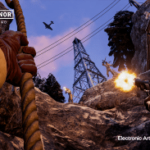Is this story-driven VR adventure worth your time? Find out in our Vanishing Grace review!
Sadly Firewatch probably isn’t coming to VR anytime soon. In its place, allow me to recommend the breezy intrigue of Vanishing Grace, a punchy one-and-done story I was happy to have seen through.
Vanishing Grace shows you what VR can lend to the ‘walking simulator’ genre, if never fully fleshing out its best ideas. Our hero, Joel, sets out to find his childhood friend, Grace, who escapes the confines of a futuristic citadel in search of adventure in a post-apocalyptic wasteland. Joel leaves behind a troubled marriage when Grace’s hovercraft returns to the citadel empty, inviting him to retrace her steps in the same vehicle.
What the four-man team at developer Monte Perdido does right with Vanishing Grace — namely authentic world-building and unique interaction — it does very well. The Madrid-based team shows a clear affection for home comforts in tight spaces not unlike those you’d find in that part of the world. Grace’s craft, where you’ll spend the vast majority of the game, offers cramped-but-cozy shelter to while away the endless desert. It’s a brilliantly-realized set that establishes itself as a welcoming home the moment you step into it; plants dangle from the ceiling, Grace’s art litters desks and the control console offers a sweeping view of the wastes stretching out in front. Were it possible I’d grab a blanket, pour a cup of coffee and hunker down on one of its chairs to enjoy the scenery.
That is to say that, while it has puzzle elements, Vanishing Grace is more an experience to drink in, watching the dunes go by on the ship’s balcony or rifling through old photos in the bedroom. It’s a game of immense pleasantries, from the gentle jingle of a piano when you discover old artifacts that Grace recounts to the fantastic 3D painted visuals shown in the opening cutscene. I was never anything less than happy to be in its world of, for lack of a better term, hygge tones.
Equally uplifting are the game’s interactions, which often complement those good vibes. Your craft runs on an energy source mined from rocks broken by throwing a boomerang, for example. Standing out on deck and mindlessly throwing and catching it helps you idly take in one of Grace’s audio-diaries instead of getting that usual VR fidgetiness. Puzzles, meanwhile, make good use of the familiarity you’ll quickly establish inside the craft, getting you to fix leaks and power outages with items you’ll mentally map around the room. There was a good opportunity to implement deeper management elements into Vanishing Grace that had you constantly maintaining Grace’s vehicle, but each puzzle is instead a one-and-done affair, and that’s a bit of a shame.
It’s also true that Vanishing Grace feels snappy to the point of appearing abridged. This extends to everything from the length and environmental design to the consistency of the world and the story’s themes. Interactivity, for example, is often selective and restricted to the part of the game you’re on. One chapter might ask you to use a screwdriver while in the next you can’t even pick that same item up and other objects are totally static. It detracts from the otherwise wonderfully-built world and constantly reminds you that you’re in a virtual game and not a living, breathing environment of its own.
Meanwhile, on the rare occasions you do step off of the craft, environments are barren and lifeless, with little to do other than quickly gather up some lost items and be on your way.
Perhaps most importantly, I’d have liked to have seen more to the game’s central story, which is only delivered in snippets over the course of a roughly 90-minute runtime. There’s substance here, as Joel wrestles with his own happiness while searching for the reasons Grace might have gone missing. His relationships with Grace and his wife, Elena, definitely appear compelling with complex depth to wade into, but we only really get to see the surface of those intricacies in the limited conversations with both. Perhaps that part of the appeal, leaving you to fill in the blanks and draw parallels with your own experiences, but it also makes an ending choice feel somewhat arbitrary, with words left unsaid and a fairly large elephant in the room that isn’t paid much attention.
Vanishing Grace Review – Final Impressions
I wish Vanishing Grace had the time to flesh out its story and design to the same level as its intoxicating central set, but it nevertheless remains a thoughtful and touching adventure I was glad I undertook. Warm VR visuals and a winning sense of space make this a great destination to breathe in even if selective interaction feels restrictive and the ride is over before you can get too comfortable. It’s a bit of a Firewatch-lite, then, but a decent starting point for a promising new developer.
For more on how we arrived at this score, read our review guidelines. What did you make of our Vanishing Grace review? Let us know in the comments below!









